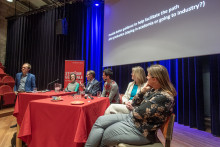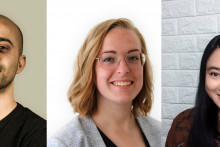'A monster with a multitude of tentacles,' was how presenter Peter Timmerman (Studium Generale) introduced the topic of debate. 'Those tentacles include teaching duties, career perspectives and publication pressure. We will not be able to tackle this monster in this hour, but no one will blame us for trying.'
A panel consisting of rector magnificus Tom Veldkamp, professor Marieke Huisman, Twente Graduate School manager Minke Klomp, PhD coach Arjenne Louter and PhD candidate Clément Lezane debated various statements, fuelled by the insights of an engaged audience - some 30 interested people, the lion's share of whom were PhD students.
The 20 percent doctrine
The first statement - 'Teaching many courses takes too much time' - touched on the educational tasks of PhD students. 'For me, on paper these amount to 166 hours a year, converting to about four hours a week,' Lezane said, 'but this does not include the time I spend preparing. I want to read up thoroughly and prepare for students' questions. For those four weekly teaching hours, I spend double the number of hours in preparation.'
Lezane received vocal support from the audience. 'The teaching load comes with peaks and troughs throughout an academic year. In some modules, I spend 50 percent of my time each week teaching, ramping up to 80 percent towards the end of a quartile,' responded one PhD candidate. 'I certainly argued with my supervisor about that, to get it down to the desired 20 percent. But not everyone is so vocal, I guess.'

'That 20 percent is an absolute maximum and should not be the norm,' replied another PhD candidate. 'Many people regard that 20 percent as the standard, while it really is a maximum.' Klomp confirmed this. 'That is indeed how it is described in the PhD Charter. And we also inform PhD students about this at TGS, so that they are aware of their rights and obligations.' Huisman added that it is important to express mutual expectations between PhD candidate and supervisor. 'I try to be as open as possible and have had to temper expectations several times with my PhD students; even though you have a teaching task, you definitely don't have to be the all-knowing expert. You can also go too far in preparing your teaching tasks thoroughly.'
Coach and referee
The discussion on the second proposition was about the role of supervisors. Or, rather, the multiplicity of roles of supervisors. 'As a PhD candidate, you are very dependent on your supervisor,' said one PhD candidate from the audience. 'To use a football metaphor: your supervisor is both coach and referee, at the same time.'
Louter recognised that perception. 'There are many good supervisors, but there are also many bad ones. With good supervisors it is easy to discuss things, but with the bad ones it is different. The relationship between PhD student and supervisor is a strange one.' According to Veldkamp, that relationship comes down to trust. 'That's what you build on. There is certainly an important role for supervisors there; you have to realise that at the end of the process you have trained a colleague. That requires mutual trust and respect.'
Fierce criticism of GP
When discussing the third statement - 'External factors like not finding good housing, a GP or work for a partner make life difficult' - the discussion took an unexpected turn. Several attendees shared negative experiences with the GP practice on campus. To illustrate, someone pointed to the Google reviews (a rating of 2.6 out of 5) of the practice. The audience asked the rector if the UT could not stop the practice.
Veldkamp responded that he was familiar with the complaints and informed that discussions were indeed held with the owner of the practice. 'Who informed us that he did not see any problems with the GP's practice,' said Veldkamp, who vehemently distanced himself from the practice. 'It is absolutely not part of this university, not at all. We completely disagree with everything this GP does. The practice is on campus, but all we do is rent out the space - to a private party in this case. We have tried to change the situation, without success.'

Driving licence
The fourth - and final - statement of the afternoon was about providing PhD candidates with career prospects: are they given enough guidance in choosing science or business? The PhD candidates present expressed their appreciation for the content of the – sometimes compulsory – courses offered by TGS, but that they involve a considerable time investment ('We are rather underestimated as PhD candidates,' echoed the audience). One attendee, former PhD candidate Roberto Cruz Martinez, suggested the idea of setting up a mentoring system. And Huisman certainly saw solace in more systemisation. 'Such as in the set-up of the annual interviews we conduct with PhD students. It would be good if career plans were standard on the agenda in the third and fourth year of someone's PhD track.'
In conclusion, Timmerman asked the rector for his vision on the UT's PhD policies. Veldkamp said he wanted to reduce the average duration of a PhD trajectory from the current five-plus years to the nominal four years. But with less pressure, his words revealed. ‘I would say: let’s put less emphasis on the length of a dissertation or the quantity of publications. As a PhD candidate, do not see your dissertation as your life's work, but rather as obtaining your driving licence as an independent scientist.'







